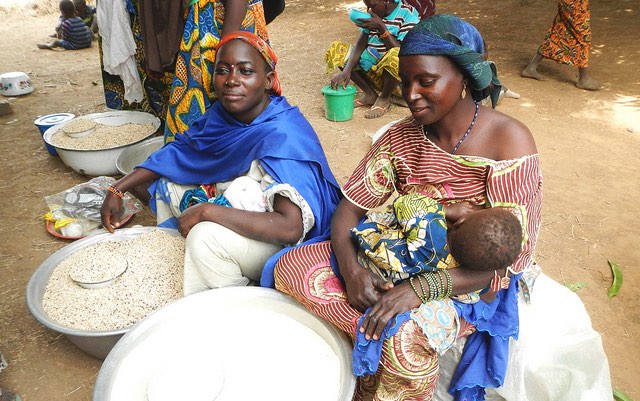Last of a series of blog posts on the release of the 2017-18 Annual Trends and Outlook Reports (ATORs) at the 2018 ReSAKSS Annual Conference in Addis Ababa Oct. 24-26. This year’s ATOR theme is social protection. Read the other posts here, here, and here.
Rooted in the notion that most poor Africans reside in rural areas and earn their income from agriculture, the Malabo Declaration emphasizes agriculture-led growth as the engine for poverty reduction. But even the most inclusive agricultural growth may not be sufficient to lift everyone out of poverty. This is because to take part in and benefit from the growth process, households need a basic level of capital and security, so that their assets are not depleted in the face of drought or other shocks. To address that vulnerability, complementary investments in social protection programs are necessary to protect the poorest and most vulnerable households, so that no one is left behind. Social protection programs are becoming increasingly popular in Africa; their numbers have tripled in the past 15 years. Today, cash transfers are the most important form of social protection in Africa, although regional differences exist (Figure 1).
How can social protection programs be designed and targeted to allow countries to effectively and efficiently meet their growing needs? What factors determine success, costs, and sustainability of those currently being implemented? How can incompatible considerations driving the social protection agenda be reconciled and how can the agenda itself be adapted to the individual country context?
ReSAKSS (Source: ASPIRE/World Bank) [CCT: Conditional cash transfers; UCT: Unconditional cash transfers]
Universal targeting may be preferable
Social protection programs typically target the poorest households or individuals. Accurate targeting as a form of rationing is a critical element of both food security and livelihood support for the poorest. Targeting does benefit the poor. In a review of benefit incidence of over 100 programs, targeted programs were found to provide approximately 25 percent more resources to the poor than random allocations. However, due to imperfect information, identifying the poorest is not a straightforward process. Targeting may also have political costs.
In situations where the income or asset distribution is flat, a combination of targeting methods may work best, such as an objective Proxy Means Test (PMT) with a community-based method. While household level verification is costly, it makes a significant difference in terms of preventing leakage. A more effective way to support the poor may be universal targeting at a localized level, where poverty and location are highly correlated. Universal targeting will substantially reduce the costs of deciding which combination of targeting mechanisms will work best, if at all; minimize exclusion errors; reduce the social tensions created when the poorest of the poor are, overnight, catapulted to income levels above the moderately poor; and be a more ethical solution in the context of local development.
Graduation requires additional support
Graduation—reducing vulnerability to the point where people can move off social protection provision—is closely linked with overall budget considerations. To graduate, households often need additional support that is not part of the basic cash transfer program. Programmatic interventions, such as Cash+ approaches, foster a more skilled workforce capable of responding to changing demand and joining the transition to higher levels of productivity. Graduation programs, a subset of Cash+ programs, typically involve providing sequenced and intensive packages of support to very poor people with the aim of raising their well-being above a threshold where they are considered out of extreme poverty, and progressing towards resilient and sustainable livelihoods. While graduation packages vary by context and program design features, prominent features are cash transfers, provision of productive assets, access to savings, livelihood trainings, and coaching. One of the key unanswered questions is the potential for scaling up these graduation models. It remains to be seen whether public servants, often burdened with several competing duties, can effectively manage graduation programs, which are often characterized by high-implementation intensity.
A one-size-fits-all social protection program is unlikely to work
Heterogeneity in household type, in location, and in population group means that a one-size-fits-all social protection program is unlikely to work, especially in targeting eligible households, and in identifying those able to exit or graduate from a program. Assumptions about similarities within a target group can be misplaced, leading to inappropriate provision for some households and premature graduation for others. Different households need diverse types of support for different lengths of time. A “leave-no-one-behind” agenda requires that a social protection policy seek to coordinate and deliver the appropriate combination of interventions to different population groups in different contexts.
Context-relevant initiatives evolving out of domestic agendas are more likely to succeed
One key lesson: In Africa, initiatives that evolve out of (or are adapted to) domestic political agendas and respond to local conceptualizations and prioritizations of need are more likely to succeed—in terms of their coverage, fiscal sustainability, political institutionalization, and impacts—than those based on imported “projectized” models. Thus, the long-term success of social protection programs depends on the strength of local and national political systems. Mobilizing the population to claim rights or entitlements from the state is an essential complement to technocratic approaches to social protection. International donors have maintained a key role in financing social protection programs in Africa, but to ensure their long-term sustainability, it is imperative that domestic tax collection systems are strengthened, and their efficiency improved.
Fleur Wouterse is a Senior Research Fellow with IFPRI’s West and Central Africa Office in Dakar.







